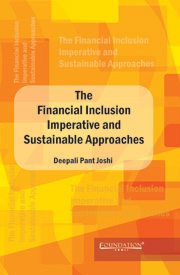Book contents
- Frontmatter
- Contents
- Foreword
- Acknowledgment
- 1 An Overview on Development
- 2 Financial Inclusion: The Nature and Extent of the Challenge
- 3 Financial Inclusion: The Indian Perspective
- 4 Tackling Financial Inclusion and RBI Policy: Responses and Voluntary Initiatives of Banks
- 5 Microfinance Experience and Other Institutional Approaches
- 6 Policy Response Committee on Financial Inclusion
- 7 International Experience in Promoting Financial Inclusion and Policy Responses
- 8 The Way Forward – Determinants and Macro Policies
- Appendix
- Bibliography
- Index
1 - An Overview on Development
Published online by Cambridge University Press: 05 June 2012
- Frontmatter
- Contents
- Foreword
- Acknowledgment
- 1 An Overview on Development
- 2 Financial Inclusion: The Nature and Extent of the Challenge
- 3 Financial Inclusion: The Indian Perspective
- 4 Tackling Financial Inclusion and RBI Policy: Responses and Voluntary Initiatives of Banks
- 5 Microfinance Experience and Other Institutional Approaches
- 6 Policy Response Committee on Financial Inclusion
- 7 International Experience in Promoting Financial Inclusion and Policy Responses
- 8 The Way Forward – Determinants and Macro Policies
- Appendix
- Bibliography
- Index
Summary
Development is a value-laden issue demanding explicit ethical analysis. Debates on development have for long been viewed in reductionist economic terms. From a policy perspective, economic development can be defined as efforts that seek to improve the economic well-being and quality of life for a community. This is achieved by creating and retaining jobs and supporting or growing incomes and the tax base. There are significant differences between ‘economic growth’ and ‘economic development’. The term ‘economic growth’ refers to the increase (or growth) of a specific measure such as real national income, gross domestic product, or per capita income. National income or product is commonly expressed in terms of a measure of the aggregate value-added output of the domestic economy termed gross domestic product (GDP). When the GDP of a nation rises, economists refer to it as ‘economic growth’.
The term ‘economic development’ on the other hand, implies much more. It typically refers to improvements in a variety of indicators such as literacy rates, life expectancy and poverty rates. GDP is a specific measure of economic welfare that does not take into account important aspects such as leisure time, environmental quality, freedom, or social justice. Economic growth of any particular measure is not a sufficient indicator of economic development.
The contemporary social scientific study of economic development encompasses, inter alia, broad theories of the causes of industrial economic modernisation plus organisational and related aspects of enterprise development in modern societies.
- Type
- Chapter
- Information
- Publisher: Foundation BooksPrint publication year: 2011

